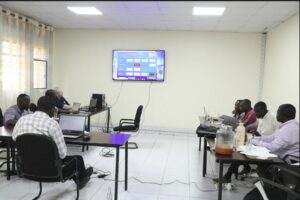8 August , Kigali ,through the Rwanda National Designated Authority (NDA) i.e., Rwanda Environment Management Authority (REMA) and the Accredited Entity (AE) i.e. Ministry of Environment (MoE) of Rwanda to the Green Climate Fund (GCF); the Global Green Growth Institute (GGGI), a Delivery Partner (DP), has been following up the implementation of the GCF NAP Readiness and Preparatory Support for Building Flood Resilience Capacities in Rwanda project that was approved in January 2020.
The main objectives of the project is to strengthen the capacity and coordination of the main institutions in floods mitigation and landslides prevention; identify and prioritize appropriate technical studies, climate finance strategies and strengthen project pipeline for effective storm water and landslide management in Kigali City and Urban areas experiencing rapid growth and vulnerable to floods and landslides; Strengthen knowledge management, information sharing and communications in terms of effective floods mitigation and landslides prevention; Develop mechanisms for Reporting, Monitoring and Review of adaptation and resilience planning progress to gather lessons and integrate them into future iterations of the identified flood mitigation and landslide management planning process.
Achieving the strengthened capacity and coordination among key stakeholders and institution, which was the ultimate goal, has not been an easy exercise, given the hardship situation of COVID-19 Pandemic that mostly hindered some of the activities that were to take place either physically or on the ground; but could not be possible due to the protocols and guidelines set to fight against the spread of Corona Virus. This report is therefore elaborated to serve as a knowledge sharing product about strategic approaches, experiences and lessons learned to achieve the desired capacity building output in the project.
Rwanda Over last 5years, Meteo Rwanda has procured an Automatic Message Switching System (AMSS) which is used to receive, verify and forward meteorological data and products by interconnecting with meteorological sub-systems and share in real-time its data and products internally and from/to the meteorological world. To operationalize the AMSS effectively, there is an organized training for METEO RWANDA Staff to enhance their capacity in maintenance and exploitation of the new features added in the existing AMSS.
Therefore Meteo Rwanda in collaboration with GGGI Rwanda organized a week long training of MESSIR Software Administrators, MESSIR-COM Observers & MESSIR-AERO Forecasters as an upgrade towards using Automatic Message Switching System (AMSS) under GCF NAP Project. The main purpose of the course will be to train Meteo Rwanda Staff including System administrators, observers, and forecasters on the full AMSS operationalization and exploitation towards the existing and new added features.

The model of training will be face-to-face learning to have hands on skills and more practical together with the trainer. The course was given in two different sessions, comprising of a series of theories, group discussions and experience sharing by participants.
The expected outputs and outcomes were as follows
2 days training for MESSIR Software administrators for them to be able to administer and monitor the system and provide support whenever needed.
5-day training for MESSIR-COMM observers for them to be able to monitor, quality check and collect error of data transmission from remote stations to Meteo Rwanda main server before transmitting to Nairobi hub using their respective workstations. They will be trained on how to organize data, encode them in the required format and send them to GTS through AMSS using USSD, email and FTP.
5 days training for MESSIR-AERO forecasters for them to explore, interpret, analyze, and use the AMSS products including charts and models.
The training was divided into 3 parts: 2 days training for MESSIR Software administrators, 1.5-day training for MESSIR-COMM observers and 1.5-day training for MESSIR-AERO forecasters.